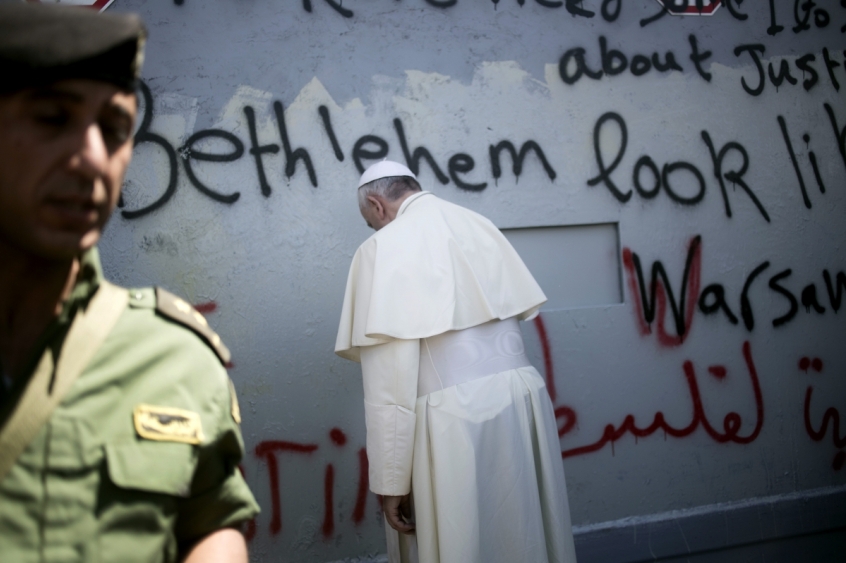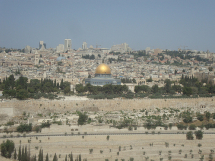
It is said that Pope Francis is not that keen on overseas visits. He believes that the job of a pastor is to stay close to his flock, and as Bishop of Rome his heart is in the Vatican. This can be the only explanation for the passage of ten months between the Pope's first overseas trip to Brazil in July 2013 (a trip that was not even planned for Pope Francis – it was intended for the previous Pope) and his frenetic three-day visit to Jordan, the West Bank and Israel this week. Even the short duration of the visit hints at the Pontiff's travel-phobia: his predecessors Pope John Paul II and Pope Benedict XVI visited the Middle East for a week each in 2000 and 2009 respectively.
Pope Francis's reluctance to tarry in the Holy Land is perhaps understandable, given the political sensitivities of the region and the fact that his every word and action would be closely scrutinised for signs of partiality to one side or the other. But he is generally regarded has having navigated the diplomatic minefield of the Middle East with tact and skill. Even on his last day in Jerusalem, he managed to soothe the ruffled feathers of his Israeli hosts, angered at the Pope's unscheduled stop at the separation barrier in Bethlehem the previous day, by adding another unplanned event, praying at Israel's Memorial to the Victims of Terror on Mount Zion. The Pope's decision to lay a wreath on the tomb of Theodor Herzl, the founder of modern Zionism, also showed a deft political touch, even if this surprised Palestinian Christians, who see themselves as the victims of Herzl's political views.
So, as Pope Francis returns to Rome, what can we divine about his private opinions on the Israel/Palestine issue? Well, Pope Francis arrived in the Holy Land with the reputation of being a friend of the Jewish people, someone who had worked hard to eradicate antisemitism from the Church and who had praised the Jews for having "kept their faith in God" despite centuries of persecution. He even brought an Argentinian rabbi with him on his visit.
But if early press comment on his trip is anything to go by, there is no doubt where the Pope's sympathies lie. Time Magazine commented that the Pope's unscheduled visit to the graffiti-covered separation barrier near Bethlehem, a stop which was reportedly initiated by the Pope himself (Israel preferred to believe that the Pope had been manipulated into the photo-opportunity by his Palestinian hosts), "provided the iconic image of the trip" and "certainly pleased the Palestinians". Meanwhile, an Op-Ed piece on the right-wing Israeli news website Arutz Sheva said the Pope's tears at the Yad Vashem Holocaust Memorial were "totally hypocritical" because of his alleged support, and that of his predecessors in the Vatican, for "the Palestinian Arab Islamic project, which is essentially a Trojan horse to dismantle the Jewish State".
Such hysterical hyperbole can be easily dismissed, but it does betray the fear of many Israelis that the Pope's sympathies are primarily with the Palestinians in their dispute with Israel. And if one looks hard enough, it is certainly possible to see such partiality in the way his visit was structured. Even before the Pope arrived, the Vatican was referring to his visit to the "State of Palestine", a diplomatic status which, though comprehensively endorsed by 138 votes to 9 in the UN General Assembly in November 2012, is not recognised by Israel. The Pope himself referred to the "State of Palestine" in his speech in Bethlehem, and called Palestinian President Mahmoud Abbas "a man of peace" (an epithet that did not get a second airing when the Pope had a rather awkward meeting with Israeli Premier Netanyahu the following day). He even travelled to the West Bank through Jordan, which greatly angered the Israeli authorities, who noted that previous Papal visits had always started in Tel Aviv.
And then there was the photo-op at the separation wall. This will – much to the annoyance of the Israelis – surely be the enduring image of the visit. Many think the Pope's few minutes of prayer by the wall were deliberate. On his visit to the West Bank he will have heard how the wall and Israeli settlements are slowly strangling Bethlehem, cutting its vital economic link with Jerusalem. He will have been told of a planned extension to the separation barrier near Bethlehem which threatens to separate a Salesian convent and school from much of its historic land and its connected monastery. The Pope will also have heard how Israeli restrictions are destroying the family life of Palestinian Christians, with husbands and wives denied permanent residence permits to live together in Jerusalem or Israel just because they are Palestinian.
Pope Francis has built his papacy on his reputation as a friend of the poor and of the underdog. After his first official visit to the Holy Land, it remains to be seen how this reputation translates into practical support for Palestinians, both Christian and Muslim, who are suffering the indignity of occupation, checkpoints and a separation barrier which is slowly but surely devouring their land.
Jeremy Moodey is Chief Executive of Embrace the Middle East.















